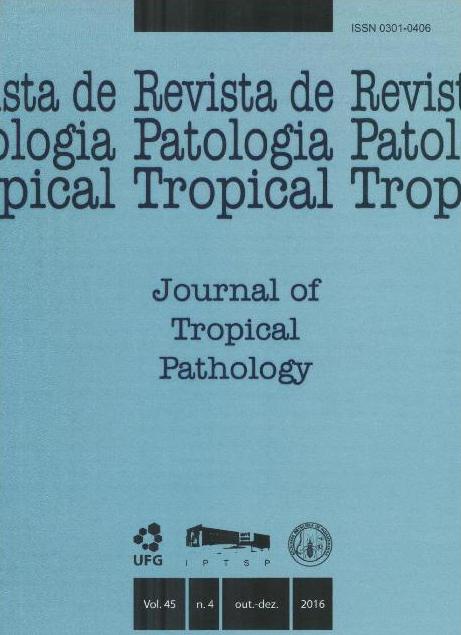NATURAL INFECTION BY Cryptosporidium SPP. IN PRODUCTION ANIMALS: FIRST DESCRIPTION OF SUBTYPE IIa15G2R1 IN GOAT KIDS AND PIGLETS IN BRAZIL
DOI:
https://doi.org/10.5216/rpt.v45i4.44639Keywords:
Cryptosporidiosis, Cryptosporidium parvum, Cryptosporidium ryanae, subgenotypes, zoonosis.Abstract
Cryptosporidiosis is a severe enteric disease, with varied clinical manifestations. In young animals the infection is more common and may be more severe. In this study the polymerase chain reaction (PCR) was used to detect Cryptosporidium parasites in goat kids, calves, lambs, piglets and colts sharing the same environment. Fecal samples were collected directly from the rectum of 192 goat kids, 184 calves, 44 lambs, 47 piglets and 26 colts aged up to twelve months, males and females, of different breeds, from the Brazilian states of Goiás, Mato Grosso do Sul, Minas Gerais and São Paulo. PCR was used for amplifying a fragment of 18S rRNA gene and the gene encoding the surface glycoprotein GP60. Positive PCR amplification was
observed in 16.7% (32/192) goat kids, 6.5% (12/184) calves and 2.1% (1/47) piglets. Based on the sequencing of 18S rRNA PCR products, all samples from goat kids were identified as C. parvum. Among calves, C. parvum was identified in 41.7% (5/12), C. andersoni in 16.7% (2/12),
C. ryanae in 16.7% (2/12) and C. bovis in 25% (3/12) of the animals. All GP60 sequences were classified as genotype IIaA15G2R1 and were found in goat kids, calves and piglets sharing the same environment. This is the first description of the molecular identification and genotyping of Cryptosporidium in goat kids and piglets in Brazil. We conclude that Cryptosporidium species
and C. parvum GP60 subtypes that infect livestock in Brazil, may act as sources of zoonotic infection for other animals and humans.
Downloads
Downloads
Published
How to Cite
Issue
Section
License
The manuscript submission must be accompanied by a letter signed by all authors stating the full name and email address, confirming that the material has not been published or is under consideration for publication elsewhere, and agreeing to transfer copyright in all media and formats for Journal of Tropical Pathology. The authors will not be paid for published articles. They are solely responsible for the content of those articles, even if the Editor holds the right to adjust them to the norms of the journal.
The reviewers will not be paid for the peer review process.

